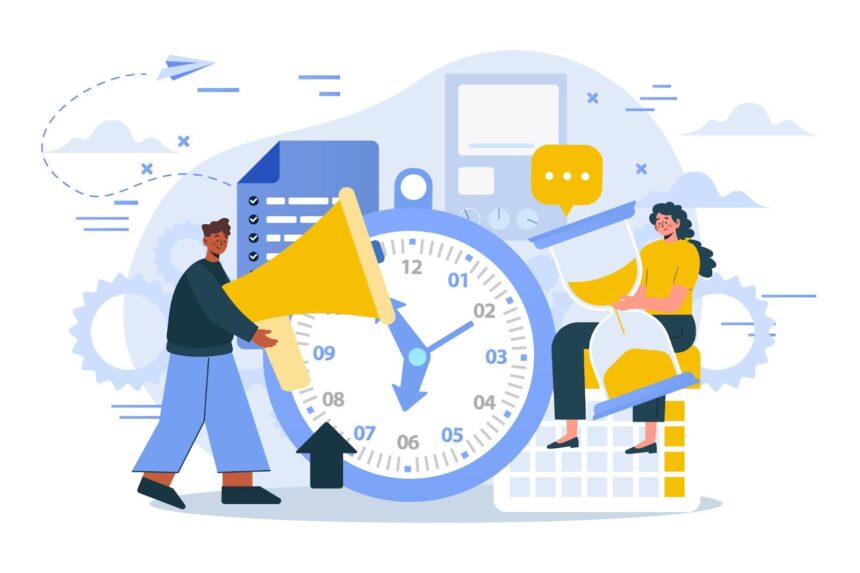Are you struggling to prioritize your everyday tasks and find enough time in your workday? With effective time management, you can take control of your schedule, improve work-life balance, and reduce procrastination. Through time management strategies, you can minimize distractions such as social media and complete more work in less time.
There are many tools you can use to take control of your time and help you get things done. You can use project management software and time management tools apps to streamline your workflow. Moreover, it can also help you with keeping urgent tasks manageable and organized. All of this can lead to less stress and better time management.
Start Your Day with a Plan
The whole project starts with a plan. If you want to effectively use your time, you should build a plan that is achievable for everything that you want to accomplish in a day. The easiest way to start planning your work is by creating a to-do list with all of your daily tasks.
A to-do list is not a groundbreaking technique, but it can make a huge difference in how well you can use your time throughout the day. Each time you fulfill tasks on your to-do list, try physically crossing them off so you have a sense of accomplishment. You can go back and do a quick review of all the things you completed that day. Keep a track of what you have fulfilled to set priorities for the next day. For larger projects or team efforts, clearly defining roles with a RACI chart can further enhance accountability and streamline workflows, much like a personal to-do list helps individual productivity.
Prioritize the Most Important Tasks
After you create a to-do list, organize it according to priority. Through prioritization, you can use your time productively and focus on the most important tasks of the day. When prioritizing your tasks on your to-do list, there are various approaches.
- Select your most important three items to fulfill and get started.
- Organize your tasks into three levels of importance: low, medium, and high.
- Rank every item on the list on a scale of 1-100. Then, order them accordingly.
Divide Larger Projects into Smaller Ones
Te Wu, CEO of PMO Advisory & Associate Professor of Montclair State University, highlights, “One of the most common reasons why people cannot manage their time well on large projects is that they get overwhelmed. The overwhelming feeling can lead you to procrastination and working on other things instead.
If you want to overcome this feeling, you can break your large projects into smaller and more manageable ones. When you look at the smaller pieces of the puzzle instead of the whole picture, you can get things done more easily. Chip away at the project tasks in bite-sized chunks, and you will make progress and enhance your overall task management.”
Limit Distractions

We all get distracted. Whether it is email from a team member, co-workers, social media, phone calls, random thoughts, kids, or family members. There are countless things that can derail your progress. Although you cannot control all of them, make a devoted effort to limit the number of things that can distract you.
Find the things that distract you and come up with solutions to reduce the distraction. Should you turn off notifications for email or texts? Do you need to turn off your phone or put your phone in the other room? Do you have to block social media from your work computer?
Leave the Email for Later
An email can be an unexpected reason for time to sink. Every time you stop what you are doing to check your email, you are derailing your productivity. It takes mental energy and time to switch between different tasks. Schedule a particular time to check your email or wait until you complete your current job before checking your email.
If you are going to set a particular time to check your email, make sure to communicate this to your co-workers and define clear expectations.
Batch Your Time
You can also use the efficiency of not switching tasks by time-blocking or batching your time. If you have a bunch of similar projects, try to do them at the same time. When you group these tasks, you can complete them quickly without dedicating the energy and brainpower to adjust to a new job. This will also help improve productivity as you are not juggling too many different tasks at once.
Reduce Multitasking Tasks
While it may feel like you are managing more things on your to-do list by multitasking, there is a chance that multitasking makes you less productive. The mental energy engaged to switch between tasks develops a lag that could be prevented by focusing on one project at a time.
You can use your time more effectively by waiting and completing the task you are working on before moving on to the other item on your list.
Block Time Off on Your Calendar
Keeping all of your meetings, deadlines, tasks, and events on your calendar can save you time. It will happen by creating a single source of truth to check these things. You can use online calendar apps to make the task even more efficient for scheduling time.
The ability to check your calendar across various devices and set reminders adds up to this time management strategy’s efficiency. Block out specific time limits for tasks to stay focused and improve productivity throughout the day.
Know When to Say NO to Meetings
Meetings are not always the most effective use of time. If the number of meetings you have is increasing, say no to some of them. Try expressing your busy schedule to the scheduler and ask if the meeting could be replaced with an email.
Explain the other tasks you already have on your schedule in your discussion. Moreover, explain how taking time for the meeting will influence your deadlines and workload. This will offer you more control over your task management and help you concentrate on your long-term goals.
Summarize and Review Your Day

Reflect on what you completed at the end of the day and set yourself up for success the next day. This is the ideal time to review your to-do list from that day to identify all of the items you checked off and what is left to be managed tomorrow.
The end-of-day review is a chance for honest self-reflection about how well you tackled your time that day. This reflection will allow you to keep track of urgent tasks and get ready for the next day more effectively. With self-reflection, you can identify what is working and where you can continue to improve.
Conclusion
Effective time management is a progressing skill that is enhanced with continuous refinement and learning. Explore new time management techniques, test different apps, and stay updated on productivity trends to refine your approach.
Engaging in consistent learning through courses, project management tools, and books will allow you to fine-tune your time management skills. Remember to work smart, not hard. Invest in long-term personal development and ensure that your approach to task management stays aligned and adaptable with your long-term goals.


